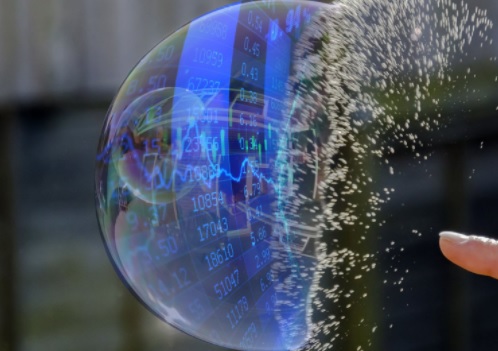The recent news of GameStop shares rallying to blue sky territory has some investors concluding that the stock was in a bubble. GameStop has recently been sold off heavily and the shares are now valued US$90 which is a significant drop from its all-time high of US$483. Although GameStop shares spiked on unusual circumstances, there are other stocks in the market where some feel that they are sitting in bubble territory. This leads to the question, what is a stock bubble and what are the characteristic of one?
Definition
A bubble in stocks occurs when the price of the shares is driven well above its intrinsic value or stock valuation. When investors start to see rapid price rises in a particular stock, they may buy into the position thinking it will keep heading higher. Other investors see this and the herd behaviour continues which pushes the prices even further.
Characteristics
A stock bubble occurs when investors come across a stock with a compelling new story. These investors believe the company has a good growth potential in the future and are willing to invest in the early stages of the firm to capitalise on the profits in the future. These companies may not be currently be making any profits so the share price of these stocks do not reflect the fundamental value of the company. Irrational exuberance is also the prevailing emotion for the stock. The investors buying this stock think it will continue to climb and other investors which haven’t brought in yet see the price appreciation and follow the crowd and buy into it as well which raises the prices even higher. Fear of missing out motives even more investors to get into the stock.
Low interest rates are another trait which has been present in bubbles. Banks are also willing to lend more and more money and the low rates encourage investors to borrow money to buy stocks which keeps these stock prices inflated.
With all bubbles however, the stock price incline does not last forever and the bubble does eventually burst. There are various reasons why a bubble may burst. Credit may be harder to obtain due to interest rate hikes or tighter credit lending regulation, so there may be less new investors interested in the stock. Institutional investors may start closing their positions fearing the stock is about to fall. Once investors start to see the share prices declining instead of increasing, they may panic and sell their position as well. This creates a domino effect as further share price depreciation adds to more panic and hysteria in the market. Investors with margin calls will be desperate to sell their positions.
Consequences of Bubbles
Recession: The 2008 recession in the US was caused by the housing bubble. People were buying houses they couldn’t afford with low interest rates and lax lending standards. When interest rates rose on these loans, home owners were unable to repay the interest repayments and this caused loan defaults which then affected the banking system. This is because banks and hedge funds bought mortgage-backed securities on the secondary market.
New Regulations: Bubbles can instigate new regulations. Stricter lending regulations were implemented after US property bubble.
Lauren Hua is a private client adviser at Fairmont Equities.
An 8-week FREE TRIAL to The Dynamic Investor can be found HERE.
Would you like us to call you when we have a great idea? Check out our services.
Disclaimer: The information in this article is general advice only. Read our full disclaimer HERE.
Like this article? Share it now on Facebook and Twitter!

